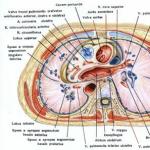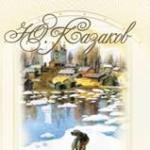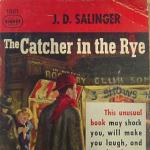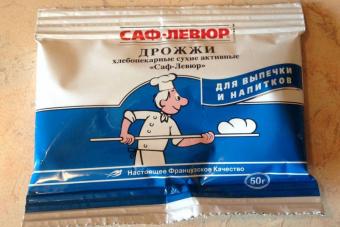On January 9, 1905, the revolution began. A peace treaty was signed with Japan, humiliating for Russia. The people, exhausted by a miserable life, rebelled. Cannon salvos sounded in the inflamed St. Petersburg air. In the cold and gloomy barracks of the Life Guards Grenadier Regiment, where Blok lived in his stepfather’s apartment, soldiers were waiting, ready to shoot at the rebellious crowd at the first order. The recent life, peaceful and free, already seemed like a theatrical scenery that could be swept away by a light breeze.
The novel “The Life of Arsenyev” is a completely new type of Bunin’s prose. It is perceived unusually easily, organically, since it constantly awakens associations with our experiences. At the same time, the artist leads us along this path, to such manifestations of personality that a person often does not think about: they seem to remain in the subconscious. Moreover, as he works on the text of the novel, Bunin removes the “key” to solving his main search, which he initially speaks about openly. Therefore, it is instructive to turn to early editions and preparations for the novel.
The wide blue Neva, just a stone's throw from the sea. It was the river that forced Peter to make a decision and found a city here. He gave him his name. But the Neva is not always blue. It often turns black and gray and freezes for six months of the year. In spring, the Neva and Ladoga ice melts, and huge ice floes rush to the sea. In autumn, the wind blows and fog envelops the city - “the most abstract and most deliberate city on the entire globe.”
« Good attitude to horses" Vladimir Mayakovsky
The hooves beat
It was as if they sang:
- Mushroom.
Rob.
Coffin.
Rough-
Experienced by the wind,
shod with ice
the street was slipping.
Horse on croup
crashed
and immediately
behind the onlooker there is an onlooker,
Kuznetsky came to flare his pants,
huddled together
laughter rang and tinkled:
- The horse fell!
- The horse fell! —
Kuznetsky laughed.
There's only one me
did not interfere with his howl.
Came up
and I see
horse eyes...The street has turned over
flows in its own way...I came up and saw -
Behind the chapels of the chapels
rolls down the face,
hiding in the fur...And some general
animal melancholy
splashes poured out of me
and blurred into a rustle.
“Horse, don’t.
Horse, listen -
Why do you think that you are worse than these?
Baby,
we are all a little bit of a horse,
Each of us is a horse in our own way.”
May be,
- old -
and didn't need a nanny,
maybe my thought seemed to go well with her,
only
horse
rushed
got to her feet,
neighed
and went.
She wagged her tail.
Red-haired child.
The cheerful one came,
stood in the stall.
And everything seemed to her -
she's a foal
and it was worth living,
and it was worth the work.
Analysis of Mayakovsky’s poem “Good attitude towards horses”
Despite his wide fame, Vladimir Mayakovsky felt like a kind of social outcast all his life. The poet made his first attempts to understand this phenomenon in his youth, when he earned his living by publicly reading poetry. He was considered a fashionable futurist writer, but few could have imagined that behind the rude and defiant phrases that the author threw into the crowd, there was a very sensitive and vulnerable soul. However, Mayakovsky knew how to perfectly disguise his emotions and very rarely succumbed to the provocations of the crowd, which sometimes disgusted him. And only in poetry could he allow himself to be himself, splashing out on paper what was sore and boiling in his heart.
The poet greeted the 1917 revolution with enthusiasm, believing that now his life would change for the better. Mayakovsky was convinced that he was witnessing the birth of a new world, more just, pure and open. However, very soon he realized that the political system had changed, but the essence of the people remained the same. And it doesn’t matter which one social class they treated it because cruelty, stupidity, treachery and mercilessness were inherent in the majority of representatives of his generation.
IN new country trying to live according to the laws of equality and brotherhood, Mayakovsky felt quite happy. But at the same time, the people who surrounded him often became the subject of ridicule and sarcastic jokes of the poet. This was a kind of defensive reaction of Mayakovsky to the pain and insults that were caused to him not only by friends and relatives, but also by random passers-by or restaurant visitors.
In 1918, the poet wrote the poem “Good Treatment of Horses,” in which he compared himself to a hunted nag, which became the subject of universal ridicule. According to eyewitnesses, Mayakovsky actually witnessed an unusual incident on the Kuznetsky Bridge, when an old red mare slipped on the icy pavement and “fell on her rump.” Dozens of onlookers immediately came running, pointing their fingers at the unfortunate animal and laughing, as its pain and helplessness gave them obvious pleasure. Only Mayakovsky, passing by, did not join the joyful and hooting crowd, but looked into the horse’s eyes, from which “behind the drops of droplets rolls down the muzzle, hiding in the fur.” The author is struck not by the fact that the horse cries just like a human, but by a certain “animal melancholy” in its look. Therefore, the poet mentally turned to the animal, trying to cheer him up and console him. “Baby, we are all a little bit of a horse, each of us is a horse in our own way,” the author began to persuade his unusual interlocutor.
The red mare seemed to feel the participation and support from the person, “rushed, stood up, neighed and walked.” Simple human sympathy gave her the strength to cope with a difficult situation, and after such unexpected support, “everything seemed to her - she was a foal, and it was worth living, and it was worth working.” It was precisely this kind of attitude from people towards himself that the poet himself dreamed of, believing that even ordinary attention to his person, not covered in the halo of poetic glory, would give him strength to live and move forward. But, unfortunately, those around him saw Mayakovsky primarily as a famous writer, and no one was interested in him inner world, fragile and contradictory. This depressed the poet so much that for the sake of understanding, friendly participation and sympathy, he was ready to happily change places with the red horse. Because among the huge crowd of people there was at least one person who showed compassion for her, something that Mayakovsky could only dream of.
In 1918, the poet wrote the poem “Good Treatment of Horses,” in which he compared himself to a hunted nag, which became the subject of universal ridicule. According to eyewitnesses, Mayakovsky actually witnessed an unusual incident on the Kuznetsky Bridge, when an old red mare slipped on the icy pavement and “fell on her rump.” Dozens of onlookers immediately came running, pointing their fingers at the unfortunate animal and laughing, as its pain and helplessness gave them obvious pleasure. Only Mayakovsky, passing by, did not join the joyful and hooting crowd, but looked into the horse’s eyes, from which “behind the drops of droplets rolls down the muzzle, hiding in the fur.” The author is struck not by the fact that the horse cries just like a human, but by a certain “animal melancholy” in its look. Therefore, the poet mentally turned to the animal, trying to cheer him up and console him. “Baby, we are all a little bit of a horse, each of us is a horse in our own way,” the author began to persuade his unusual interlocutor.
The red mare seemed to feel the participation and support from the person, “rushed, stood up, neighed and walked.” Simple human sympathy gave her the strength to cope with a difficult situation, and after such unexpected support, “everything seemed to her - she was a foal, and it was worth living, and it was worth working.” It was precisely this kind of attitude from people towards himself that the poet himself dreamed of, believing that even ordinary attention to his person, not covered in the halo of poetic glory, would give him strength to live and move forward. But, unfortunately, those around him saw Mayakovsky primarily as a famous writer, and no one was interested in his inner world, fragile and contradictory. This depressed the poet so much that for the sake of understanding, friendly participation and sympathy, he was ready to happily change places with the red horse. Because among the huge crowd of people there was at least one person who showed compassion for her, something that Mayakovsky could only dream of.
The hooves beat
It was as if they sang:
- Mushroom.
Rob.
Coffin.
Rough-
Experienced by the wind,
shod with ice
the street was slipping.
Horse on croup
crashed
and immediately
behind the onlooker there is an onlooker,
Kuznetsky came to flare his pants,
huddled together
laughter rang and tinkled:
- The horse fell!
- The horse fell! —
Kuznetsky laughed.
There's only one me
did not interfere with his howl.
Came up
and I see
horse eyes...
The street has turned over
flows in its own way...
I came up and saw -
Behind the chapels of the chapels
rolls down the face,
hiding in the fur...
And some general
animal melancholy
splashes poured out of me
and blurred into a rustle.
“Horse, don’t.
Horse, listen -
Why do you think that you are worse than these?
Baby,
we are all a little bit of a horse,
Each of us is a horse in our own way.”
May be,
- old -
and didn't need a nanny,
maybe my thought seemed to go well with her,
only
horse
rushed
got to her feet,
neighed
and went.
She wagged her tail.
Red-haired child.
The cheerful one came,
stood in the stall.
And everything seemed to her -
she's a foal
and it was worth living,
and it was worth the work.
Text of the poem “Good attitude towards horses”
Hooves struck.
It was as if they sang:
Experienced by the wind,
Shod with ice,
the street was slipping.
Horse on croup
crashed
behind the onlooker there is an onlooker,
Kuznetsky came to flare his pants,
huddled together
laughter rang and tinkled:
- The horse fell! –
- The horse fell! –
Kuznetsky laughed.
horse eyes...
The street has turned over
flows in its own way...
I came up and saw -
behind the chapels chapels
rolls down the face,
hiding in the fur...
And some general
animal melancholy
splashes poured out of me
and blurred into a rustle.
“Horse, don’t.
Horse, listen -
Why do you think that you are worse than them?
we are all a little bit of a horse,
Each of us is a horse in our own way.”
May be,
- old -
and didn't need a nanny,
maybe my thought seemed to her
rushed
got to her feet,
She wagged her tail.
Red-haired child.
The cheerful one came,
stood in the stall.
And everything seemed to her -
she's a foal
and it was worth living,
and it was worth the work.
V. Mayakovsky’s poem “Good attitude towards horses” goes back to the pages of Russian classics and folklore. In Nekrasov, Dostoevsky, Saltykov-Shchedrin, the horse often symbolizes an uncomplaining, submissive worker, helpless and oppressed, evoking pity and compassion.
It’s curious what creative problem Mayakovsky solves in this case, what does the image of an unhappy horse mean to him? Mayakovsky, an artist whose social and aesthetic views were very revolutionary, proclaimed with all his work the idea of a new life, new relationships between people. The poem “Good Treatment of Horses” affirms the same idea with its novelty of artistic content and form.
Compositionally, the poem consists of 3 parts, symmetrically arranged: the first (“the horse fell”) and the third (“the horse… went”) frame the central one (“the horse’s eyes”). The parts are connected by both the plot (what happens to the horse) and the lyrical “I”. First, the attitude of the lyrical hero and the crowd to what is happening is contrasted:
Kuznetsky laughed.
Then close up the horse’s eyes and the tears in them “behind the drops of the chapel” are given - the moment of humanization, preparing the culmination of the lyrical hero’s experience:
We are all a little bit of a horse
Each of us is a horse in our own way.
The figurative system within which the lyrical conflict unfolds is represented by three sides: the horse, the street, and the lyrical hero.
The figure of Mayakovsky’s horse is very unique: it is devoid of signs of a victim. social conflict. There is neither a rider nor luggage that could personify hardships and oppression. And the moment of the fall is not due to fatigue or violence (“I was shod with ice, the street was slipping…”). The sound side of the verse emphasizes the hostility of the street. Alliteration:
not so much onomatopoeic (Mayakovsky did not like this), but rather meaningful and, in combination with the words “croup”, “crashed”, “huddled” at the sound level, gives an “increment” of meaning. The street of early Mayakovsky is often a metaphor for the old world, philistine consciousness, and an aggressive crowd.
The crowd will go wild... (“Here!”)
The crowd piled in, huge, angry. (“That’s how I became a dog.”)
In our case, this is also an idle crowd, dressed up:
...behind the onlooker there is an onlooker,
The pants that Kuznetsky came to have bell-bottoms...
It is no coincidence that the street is Kuznetsky, behind which a trail of certain associations stretches back to the times of Griboedov (“from where fashion came to us...”). The unceremoniousness of the crowd is emphasized by the choice of verbs: “the laughter rang and tinkled.” The sounds “z”, “zv”, persistently repeated, reinforce the meaning of the word “onlooker”; the same thing is emphasized by the rhyme: “onlooker” - “tinkled.”
Contrasting the “voice” of the lyrical hero with the “howl” of the crowd and bringing it closer to the object of everyone’s attention is carried out lexically, syntactically, phonetically, intonationally, and also with the help of rhymes. Parallelism of verbal constructions (“I came up and saw”), rhymes (“I am the only one” - “horse”, “howl to him” - “in my own way”, visual (eyes) and sound images (“behind the temples of the temple...rolls”, “splash”) - a means of enhancing the impression of the picture itself, thickening the emotions of the lyrical hero.
“General animal melancholy” is a metaphor for the complex psychological state of the lyrical hero, his mental fatigue and hopelessness. The sounds “sh - shch”, going back to the word “general”, become cross-cutting. The affectionate and condescending address “baby” is addressed to “those in need of a nanny,” that is, to those who associate their state of mind with Mayakovsky’s soft and, in their own way, deep maxim: “... we are all a little bit of a horse, each of us is a horse in our own way.” The central image of the poem is enriched with new semantic shades and acquires psychological depth.
If Roman Yakobson is right, he believed that Mayakovsky’s poetry
there is “poetry of highlighted words,” then such words in the final fragment of the poem should be considered, apparently, “worth living.” Pun rhyme (“went” - “went”), persistent reinforcement of meaning with sound and rhyme (“ ditch got lost”, “ LOL anula”, “ r s and th r baby”-“ and e r child”), repetition of etymologically similar words (“stood up”, “became”, “stall”), homographic proximity (“stall” - “stood”) give an optimistic, life-affirming character to the ending of the poem.
How often in life does a person need support, even just a kind word. As they say, kind word and the cat is pleased. However, sometimes it is very difficult to find mutual understanding with the outside world. It was this theme - the confrontation between man and the crowd - that the early poems of the futurist poet Vladimir Mayakovsky were devoted to.
In 1918, during severe trials for the young Soviet republic, in the days when other poets, such as Alexander Blok, called:
Keep your revolutionary pace!
The restless enemy never sleeps!
It was at such a time that Mayakovsky wrote a poem with an unexpected title - "Good attitude towards horses", to which the analysis is devoted.
This work immediately amazes with its abundance alliteration. At the core plot- the fall of an old horse, which aroused not just the lively curiosity of the crowd, but even the laughter of onlookers who surrounded the place of the fall. Therefore, alliteration helps to hear the clatter of an old nag’s hooves ( "Mushroom. Rob. Coffin. Rude."), and the sounds of a crowd eager for spectacle ( "The laughter rang and jingled", "behind the onlooker there is an onlooker").
It is important to note that the sounds that imitate the heavy tread of a nag also carry a semantic connotation: the peculiar call is especially clearly perceived "Rob" combined with words "coffin" And "rude". In the same way, the tinkling laughter of onlookers, “Kuznetsky came to flare the pants”, merges into a single howl, reminiscent of a flock of portages. This is where it appears lyrical hero, which “one voice did not interfere with the howling”, a hero who sympathized with a horse that not just fell, but "crashed" because he saw "horse eyes".
What did the hero see in those eyes? Longing for simple human participation? In M. Gorky’s work “The Old Woman Izergil,” Larra, who rejected people, since he himself was the son of an eagle, did not live without them, and when he wanted to die, he could not, and the author wrote: “There was so much melancholy in his eyes that it was possible would poison all the people of the world with it.” Perhaps there was just as much of her in the eyes of the unfortunate horse, but those around her did not see it, although she was crying:
Behind the chapels of the chapels
rolls down the face,
hiding in the fur...
The hero's sympathy turned out to be so strong that he felt “some kind of general animal melancholy”. It is this universality that allows him to declare: “Baby, we are all a little bit of a horse, each of us is a horse in our own way.”. Indeed, hasn’t everyone had days when failures followed one after another? Didn't you want to give up everything and give up? And some even wanted to kill themselves.
How to help in such a situation? Support, say words of consolation, sympathy, which is what the hero does. Of course, as he speaks his words of encouragement, he realizes that “maybe the old one didn’t need a nanny”, after all, not everyone is pleased when there are witnesses to his momentary weakness or failure. However, the hero's words had a miraculous effect: the horse is not just “I got to my feet, neighed and walked away”. She also wagged her tail ( "red child"!), because I again felt like a foal, full of strength and as if starting to live again.
Therefore, the poem ends with a life-affirming conclusion: “It was worth living and it was worth working”. Now it is clear that the title of the poem “Good attitude towards horses” is perceived in a completely different way: Mayakovsky, of course, meant a good attitude towards all people.
In 1918, when fear, hatred, and general anger reigned all around, only a poet could feel the lack of attention to each other, the lack of love, the lack of sympathy and mercy. It is not for nothing that in a letter to Lilya Brik in May 1918, he defined the idea of his future work as follows: “I don’t write poetry, although I really want to write something heartfelt about a horse.”
The poem actually turned out to be very heartfelt, largely thanks to Mayakovsky’s traditional artistic means. This and neologisms: "opita", "flare", "chapel", "worse". This and metaphors: "the street has capsized", "laughter rang out", "the melancholy poured out". And, of course, this rhyme is, first of all, inaccurate, since it was Mayakovsky’s preference. In his opinion, an imprecise rhyme always gives rise to an unexpected image, association, idea. So in this poem there are rhymes "kick - horse", “wool rustles”, “worse is a horse” give rise to an endless number of images, causing each reader to have their own perception and mood.
- “Lilichka!”, analysis of Mayakovsky’s poem
- “The Sitting Ones”, analysis of Mayakovsky’s poem





